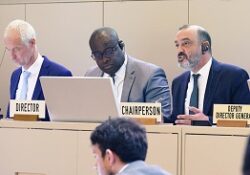At the first negotiation meeting on agriculture following the summer break on 18 September, WTO (World Trade Organization) members discussed the way forward for the farm talks.
The African Group and the Cairns Group of agricultural exporting countries reported progress on key issues in their discussions and expressed hopes of presenting joint proposals in the near future. Brazil proposed to establish a dialogue on sustainable agriculture.
Summarizing his informal consultations with members last week, the Chair of the negotiations, Ambassador Alparslan Acarsoy of Türkiye, highlighted a recurring emphasis on the need to rebuild trust among members.
The Chair highlighted a widespread desire to resume negotiations as soon as possible and to focus on substance, with the goal of initiating text-based talks early enough before the 14th Ministerial Conference (MC14).
There was a suggestion, he noted, to enhance political leadership by convening periodic negotiation meetings at the Head-of-Delegation level to review progress and to involve senior officials in addressing particularly intractable issues.
Regarding the procedural steps forward, the Chair outlined two suggestions from the consulted members. One option is to establish informal small groups on various topics, each led by key proponents. The second option is for the Chair to appoint facilitators to lead such thematic negotiations.
Other recommendations included setting milestones in the lead-up to MC14, adopting a comprehensive approach in the negotiations, and considering the relevance of past mandates when defining priorities.
Members welcomed the Chair’s efforts to advance the negotiations and shared their views on the way forward. Members emphasized the importance of inclusiveness and transparency and the central role of the Committee on Agriculture in Special Session as the primary forum for negotiations.
Questions were raised about the possible structure of the suggested thematic working group discussions. Some members called for pragmatic interest-based discussions, while others emphasized the need to honour past mandates or underscored the need for a balanced and realistic approach across the board.
Several members also called for fresh perspectives. They noted the quality of the discussions held on agriculture during the Public Forum and the workshop organized by the WTO in early July and suggested convening additional seminars to introduce new insights into the negotiations.
The African Group and the Cairns Group informed delegates that their bilateral meetings, which resumed after the summer break, have been conducted on a weekly basis. These technical-level discussions aim to find common ground and to draft modalities across all topics, in particular domestic support and public stockholding for food security purposes. They stressed the willingness of participants to engage constructively and expressed the hope that a joint proposal will be submitted to the committee for consideration in the near future.
The Chair encouraged members to engage in substantive discussions on specific topics. He cited the ongoing collaboration between the African Group and the Cairns Group as a positive example.
On the same day, members also participated in discussions at dedicated sessions on public stockholding and the Special Safeguard Mechanism.
Brazil’s new submission on sustainable agriculture
Brazil presented its submission titled “Dialogue on sustainable agriculture in the multilateral trading system” (JOB/AG/261), also circulated to the General Council and other WTO bodies in July. Brazil emphasized the urgent need to address more forcefully in the WTO critical sustainability challenges, with a view to ensuring WTO disciplines better support a more sustainable and resilient food and agriculture system, while not creating unnecessary trade restrictions, distortions or discrimination, and not weakening the fight against hunger and poverty.
The submission noted the cross-cutting nature of this issue across various committees and called for the General Council to take the lead with a retreat on the topic in the second half of 2024, followed by a report on progress made at a senior officials’ meeting on agriculture in the second half of 2025.
Members welcomed Brazil’s initiative and agreed that sustainability is a critical component of agricultural reform. Many expressed a willingness to engage in thematic discussions and participate in the proposed retreat. Members also suggested specific topics for further deliberation, including technology transfer, climate-smart agriculture, precision farming, and trade-restrictive measures implemented under the guise of environmental protection.
Several members stressed the need to address jointly the environmental, economic and social dimensions of sustainability, encompassing food security and the livelihood of small farmers.

